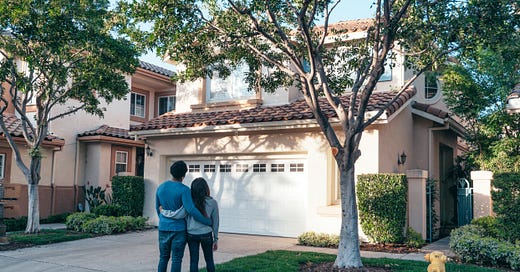One Big Way to Boost Housing Supply and Reduce Investor-Owned Housing
It's a new idea that just maybe could work
The housing market is stuck right now. Most of the people who bought houses in the past 20 years have locked in mortgages at historically low rates. They’ve accrued considerable equity as the housing market has boosted their house’s worth, but they can't cash out for a cheaper house because of the cost of the mortgage on that new property. For example, the cost of a $500,000 mortgage at 3 percent is the same as a $300,000 mortgage at 7.5 percent. So most people are postponing selling their homes, unless they need to sell due to a death or a move to a new city.
You would think that high interest rates and expensive mortgages would cause housing prices to tumble, but because housing supply is so low, it can’t keep up with buyer demand, so housing prices remain high. This is keeping inflation high, which keeps interest rates high — it’s an unfortunate upward spiral.
But what if you could somehow create a sense of urgency and an incentive to sell houses? That would unlock a lot of housing for sale.
The federal government occasionally creates short-term financial incentive programs to manipulate the economy. For example,in 2008, as part of the Housing and Economic Recovery Act, Congress authorized a tax credit for first-time homebuyers (originally $7,500, later $8,000) for houses purchased by 2010. At the time, buyers were wary of getting back into the housing market and this program helped get some of them off the sidelines.
Then in 2009, the Car Allowance Rebate System, better known as Cash for Clunkers, ripped through $3 billion in financial incentives for car owners who traded in their old, inefficient cars for new fuel-efficient ones. The program ran out of money in a matter of weeks after nearly 700,000 people traded in their cars.
What worked so well for these programs was the sense of urgency: people had to act fast or lose out.
Here’s an idea for a new program that the federal government could support to get more houses on the market quickly: provide a one-year tax amnesty on capital gains taxes for real estate investors who sell their houses to homeowners. The houses would need to be the buyers’ primary residence.
This program would have the potential to achieve several goals at once:
It would unlock the nearly 20 percent of housing stock estimated to be owned by investors
It would replace investor housing 1 for 1 with homeowner-occupied housing
Depending on the scale of participation, it could lower the price of housing by boosting the supply of housing for sale
While it sounds like this is just a tax break for wealthy investors, many investors indefinitely postpone paying capital gains taxes anyway by reinvesting their gains in other properties (called a 1031 exchange). This often means that once investors buy property in a market, they never leave the market, they just move their money to a new property, increasing their equity without paying taxes on it.
This program also improves upon another capital gains tax break — the ineffective Opportunity Zones — by giving investors an easy way out of a real estate market, potentially forever. The timing could be good as well: Investors are right now backing away from new purchases of single-family homes. But they have been holding on to their existing purchases because there’s no need to sell.
Perhaps this program could provide a much-needed time-sensitive reason to sell, and help to get more regular homeowners in a class of housing that has lately been off limits.
What do you think? Let me know in the comments below!
Also, thank you to those who have subscribed! If you haven’t already, please consider upgrading to paid to support this kind of writing.








I don't understand this logic. If 1031 already makes taxes moot why would this do anything? This proposal rewards investors and speculators in the market. They either need to adjust their rental rates (downward) or default on their debt. Real estate markets are slow. We will see much more inventory as builders catch up. This scenario is preferable to a government handout.
Your idea sounds interesting. You need to take it on the road and get "the powers that be" in Washington, D.C. to consider it.